Guinea pigs are lovely and sociable little animals that require a well-balanced diet to maintain their health. As a guinea pig owner, it is essential to understand what food options are safe for your furry friend. Bamboo is a popular food choice for many herbivores, but can guinea pigs eat bamboo?
In this section, we will explore whether bamboo is a suitable food option for guinea pigs. We will provide expert tips on safely incorporating bamboo into your guinea pig’s diet and important precautions to take.
Key Takeaways:
- Bamboo can be a safe and nutritious food option for guinea pigs if introduced correctly.
- It’s important to understand your guinea pig’s nutritional needs before adding bamboo to their diet.
- Proper preparation and serving of bamboo is crucial to safely introducing it into your guinea pig’s diet.
- Monitoring your guinea pig’s response is necessary to ensure there are no adverse effects.
- Other suitable food options should also be included in your guinea pig’s diet to provide a balanced nutrition.
Understanding Guinea Pig’s Nutritional Needs
Guinea pigs have specific nutritional requirements for optimal health and wellbeing. A balanced diet should provide them with essential nutrients, including:
- High-quality hay: This should make up the majority of your guinea pig’s diet. Hay provides the necessary fiber to keep their digestive tract healthy and prevent dental problems.
- Fresh vegetables: Guinea pigs require a daily intake of fresh vegetables such as bell peppers, carrots, and leafy greens. These provide important vitamins and minerals.
- Small amounts of fruit: While fruit should not be the main component of a guinea pig’s diet, small amounts of fruit can provide additional vitamins and sweetness.
- Pelleted food: Pellets specifically formulated for guinea pigs can provide additional nutrients, but should be fed in moderation as they can be high in calories.
- Water: Access to clean, fresh water is essential for guinea pigs to stay hydrated.
It is important to note that guinea pigs cannot produce vitamin C, so it is crucial to provide them with a consistent source of this nutrient in their diet. Fresh vegetables such as bell peppers, kale, and broccoli are excellent sources of vitamin C.
What to Avoid:
Guinea pigs have sensitive digestive systems and there are certain foods that should be avoided. These include:
- High-fat and high-sugar foods
- Dairy products
- Chocolate
- Nuts and seeds
- Onions and garlic
By understanding the nutritional needs of your guinea pig, you can provide a healthy and well-rounded diet that promotes their overall wellbeing.
Introducing Bamboo as a Food Option
As herbivores, guinea pigs require a diet rich in fiber, vitamin C, and other essential nutrients for their overall health. Bamboo is a unique food option that can provide nutritional benefits to your pet, such as dietary fiber, potassium, and protein.
However, it is important to note that bamboo should only be introduced as an occasional treat in your guinea pig’s diet, and not as a staple food. While bamboo shoots are safe for your pet to eat, they should be washed and prepared properly to remove any harmful substances or pesticides.
Your guinea pig’s diet should consist mainly of hay, fresh vegetables, and a high-quality pellet food suited to their nutritional needs. Introducing bamboo as a food option can provide variety and enrichment for your pet, but it is best to consult your veterinarian before making any significant dietary changes.
Nutritional Content of Bamboo
Bamboo is a rich source of dietary fiber, providing both soluble and insoluble fiber that can aid in maintaining a healthy digestive system for your guinea pig. It also contains potassium, which can support heart function and muscle health.
Bamboo shoots offer a small amount of protein, which can be beneficial to your pet’s overall health. They also contain various vitamins and minerals, including calcium, iron, and magnesium.
It is important to note that while bamboo can provide nutritional benefits, it should not replace essential foods in your guinea pig’s diet. Consulting with a veterinarian can help you determine the appropriate amount of bamboo to include in your pet’s diet, and how often they can enjoy this unique food option.
Benefits of Bamboo for Guinea Pigs
Bamboo can offer various benefits to guinea pigs when included in their diet in moderation. Here are some of the advantages:
- Promotes dental health: Guinea pigs have constantly growing teeth, and chewing on bamboo can help wear them down naturally.
- Provides enrichment: Eating bamboo can be a fun and stimulating activity for guinea pigs, promoting mental and physical health.
- Rich in nutrients: Bamboo is an excellent source of fiber, which is essential for digestive health and can prevent obesity and other related problems.

It is important to note that while bamboo can offer these benefits, it should not make up the sole component of a guinea pig’s diet. A varied and balanced diet is necessary for their overall health and well-being.
Potential Risks and Considerations
While bamboo can be a great food option for guinea pigs, there are some potential risks and considerations to keep in mind. One risk is that bamboo shoots contain a high amount of oxalates, which may cause bladder stones in some guinea pigs. Therefore, it’s essential to introduce bamboo gradually and in small portions.
Another consideration is the quality of the bamboo. Make sure to provide only fresh, clean, and pesticide-free bamboo to your guinea pigs. It’s also important to note that bamboo should only serve as a supplement to your guinea pig’s regular diet and should not be the primary food source.
If you notice any signs of digestive issues, such as bloating, soft stools, or diarrhea, discontinue feeding bamboo and consult with your veterinarian. Lastly, it’s crucial to monitor your guinea pig’s weight during the introduction of bamboo. Excessive weight loss or gain may indicate an issue with their diet.
Preparing and Serving Bamboo to Guinea Pigs
Now that we’ve established bamboo as a potential food option for guinea pigs, it’s important to understand how to safely prepare and serve it to your furry friend. Follow these practical tips:
Cleaning Bamboo
Thoroughly clean the bamboo to remove any dirt, bacteria, or possible pesticides. Rinse it with cold water and use a vegetable brush to scrub the surface.
Cutting and portion sizes
Use clean, sharp scissors or pruning shears to cut the bamboo into small, manageable portions suitable for your guinea pig’s size. Avoid feeding your pet large stalks as they can be difficult to eat and may cause choking or digestive problems.
Frequency of feeding
Bamboo should only be given to guinea pigs as an occasional treat as it is not a primary part of their diet. Limit the intake to no more than a few times a week to avoid any nutritional imbalances.
Feeding methods
Offer the bamboo to your guinea pig in its natural form or mix it with other fresh veggies. Serve the bamboo in a feeding dish or place it in an easy-to-reach location to encourage your pet’s natural foraging behavior.
By following these simple steps and monitoring your guinea pig’s reaction, you can introduce bamboo into their diet safely and responsibly.
Monitoring Your Guinea Pig’s Response to Bamboo
Once you have introduced bamboo to your guinea pig’s diet, it is crucial to closely monitor their response. Not all guinea pigs will react positively to bamboo, and in some cases, it can cause adverse reactions.
It is recommended to start by giving your guinea pig a small piece of bamboo, approximately the size of a fingernail. Observe your pet’s reaction and behavior for the next 24 hours, checking for any signs of lethargy, diarrhea, or other unusual symptoms. If your guinea pig shows any adverse reactions, discontinue the use of bamboo as a food option.
It is important to note that bamboo should only be given as an occasional treat, and not a regular part of your guinea pig’s diet. Excessive consumption of bamboo can cause gastrointestinal problems and dental issues, so always be mindful of the portion sizes and frequency of feeding.
Remember, monitoring your guinea pig’s response to bamboo is crucial for their overall health and well-being.
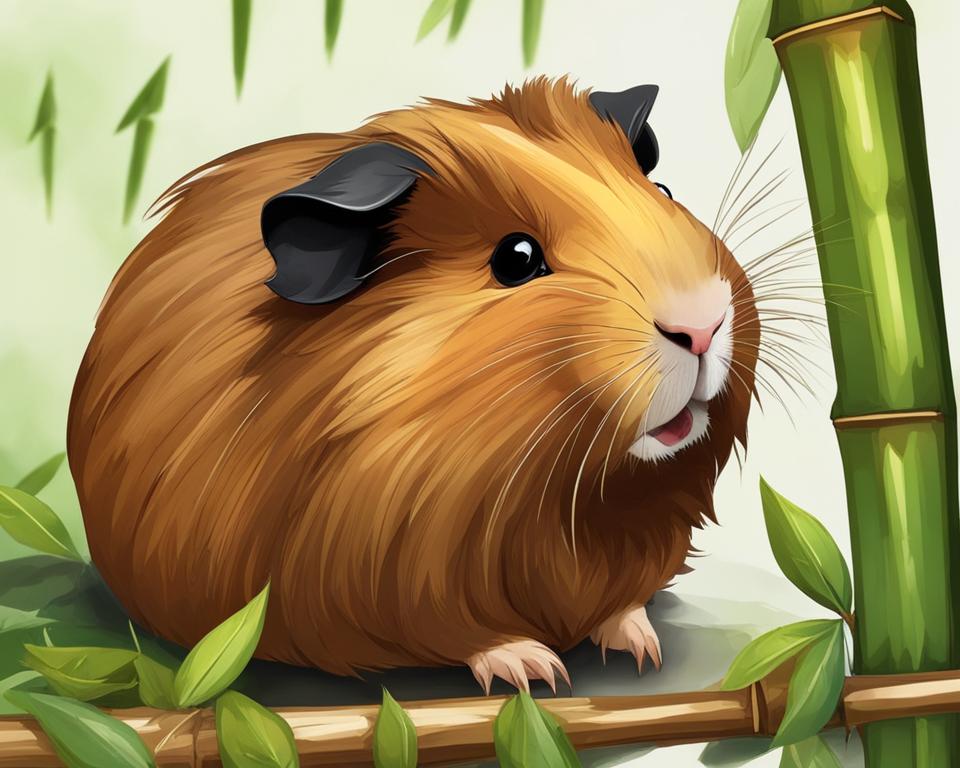
Other Suitable Food Options for Guinea Pigs
While bamboo is a great treat for guinea pigs, it should not be the only food they eat. To provide a well-balanced and varied diet for your pet, consider incorporating some of these suitable food options:
1. Hay
Hay is an essential part of a guinea pig’s diet and should be available to them at all times. Timothy, orchard, or meadow hay are good options.
2. Fresh Vegetables
Guinea pigs love fresh vegetables such as leafy greens (kale, lettuce, spinach), bell peppers, and carrots. However, it is important to introduce new vegetables gradually and in small portions to avoid digestive issues.
3. Pellets
Pellets are a convenient and nutritious food option for guinea pigs. Look for high-quality pellets that contain vitamin C, an essential nutrient for guinea pigs.
4. Fruits
Fruits can be given to guinea pigs as an occasional treat. Some suitable options include apples, strawberries, and blueberries.
5. Herbs
Adding herbs like parsley, cilantro, and basil to your guinea pig’s diet can provide additional nutrients and make their meals more enjoyable.
Overall, ensuring your guinea pig receives a balanced diet with a variety of suitable food options is essential for their health and well-being.
Professional Veterinary Advice
When it comes to making significant changes to your guinea pig’s diet, it is essential to seek professional veterinary advice. A veterinarian can provide professional insight into your guinea pig’s nutritional requirements and ensure that any changes to their diet are safe and healthy.
Professional veterinary advice can also help you identify any potential health problems that may arise from improper feeding. Your veterinarian can educate you on the signs to look for, and provide guidance on how to monitor your guinea pig’s behavior and health.
Remember that guinea pigs have unique dietary needs, and what may be safe and healthy for other animals may not be appropriate for your guinea pig. Consulting with a veterinarian is the best way to ensure that your guinea pig gets the proper nutrition they need to thrive.
Conclusion
After reviewing the nutritional needs of guinea pigs and exploring the benefits and potential risks of feeding them bamboo, it is clear that bamboo can be a suitable addition to their diet. However, it is important to introduce it gradually, closely monitor your pet’s response, and consult a veterinarian if you have any concerns.
Providing your guinea pig with a balanced and varied diet is crucial for their overall health and wellbeing. While bamboo can offer nutritional benefits and enrichment, it should be included as part of a diverse selection of food options.
By following the safe feeding tips and advice outlined in this article, you can confidently incorporate bamboo into your guinea pig’s diet as an occasional treat. Always prioritize your pet’s health and seek professional veterinary advice whenever necessary.
FAQ
Can guinea pigs eat bamboo?
Yes, guinea pigs can eat bamboo, but it should be served in moderation. Bamboo leaves and stalks are safe for guinea pigs to consume and can provide some nutritional benefits.
Is bamboo a suitable food option for guinea pigs?
Bamboo can be included in a guinea pig’s diet as an occasional treat. It is essential to ensure that bamboo is clean and free from pesticides before serving it to your guinea pigs.
What are the benefits of bamboo for guinea pigs?
Bamboo can offer various benefits to guinea pigs. It is a good source of fiber, which promotes healthy digestion and helps prevent gastrointestinal issues. Additionally, bamboo can help wear down their teeth and provide mental stimulation as a chew toy.
Are there any potential risks or considerations when feeding bamboo to guinea pigs?
While bamboo is generally safe for guinea pigs, it should be given in small quantities. Too much bamboo can lead to digestive problems like diarrhea. Always monitor your guinea pig’s response to bamboo and consult a veterinarian if you notice any adverse effects.
How should I prepare and serve bamboo to my guinea pigs?
Before serving bamboo to your guinea pigs, ensure that it is thoroughly washed to remove any dirt or contaminants. Cut the bamboo into small, bite-sized pieces to make it easier for your guinea pigs to eat. Introduce bamboo gradually into their diet and monitor their response.
What are some other suitable food options for guinea pigs?
In addition to bamboo, guinea pigs need a balanced diet that includes hay, fresh vegetables, and a small amount of pellets. Some suitable food options for guinea pigs include leafy greens like romaine lettuce and spinach, bell peppers, carrots, and cilantro.
Should I seek professional veterinary advice before feeding bamboo to my guinea pigs?
Yes, it is always recommended to consult a veterinarian before making any significant dietary changes for your guinea pigs. They can provide personalized advice based on your guinea pig’s specific needs and ensure a balanced and healthy diet.

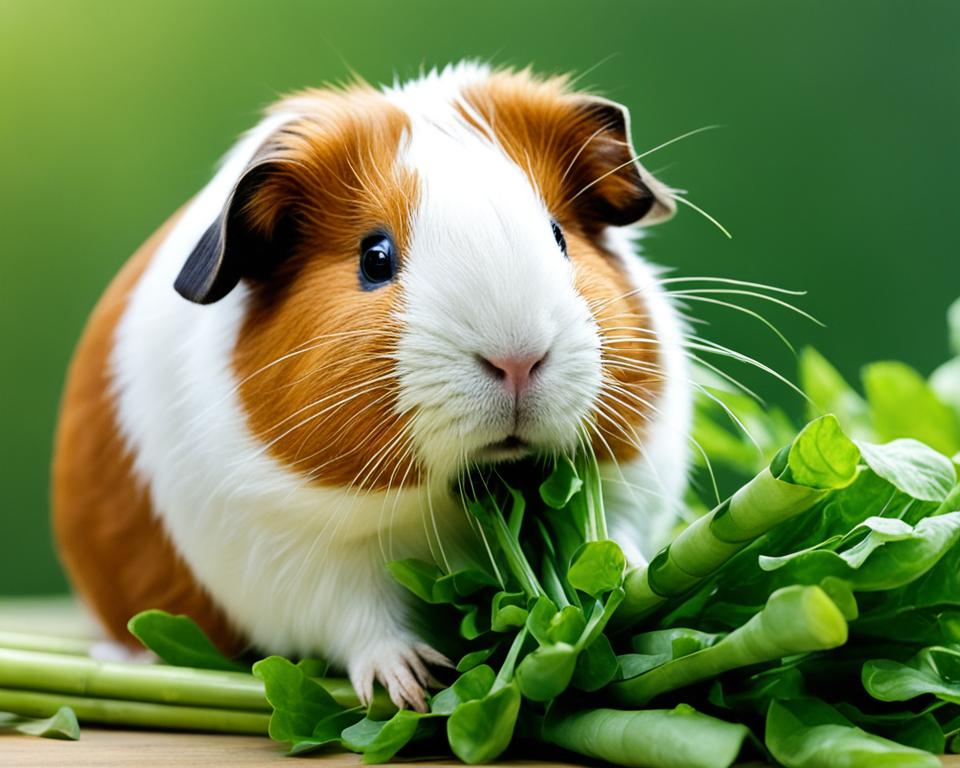
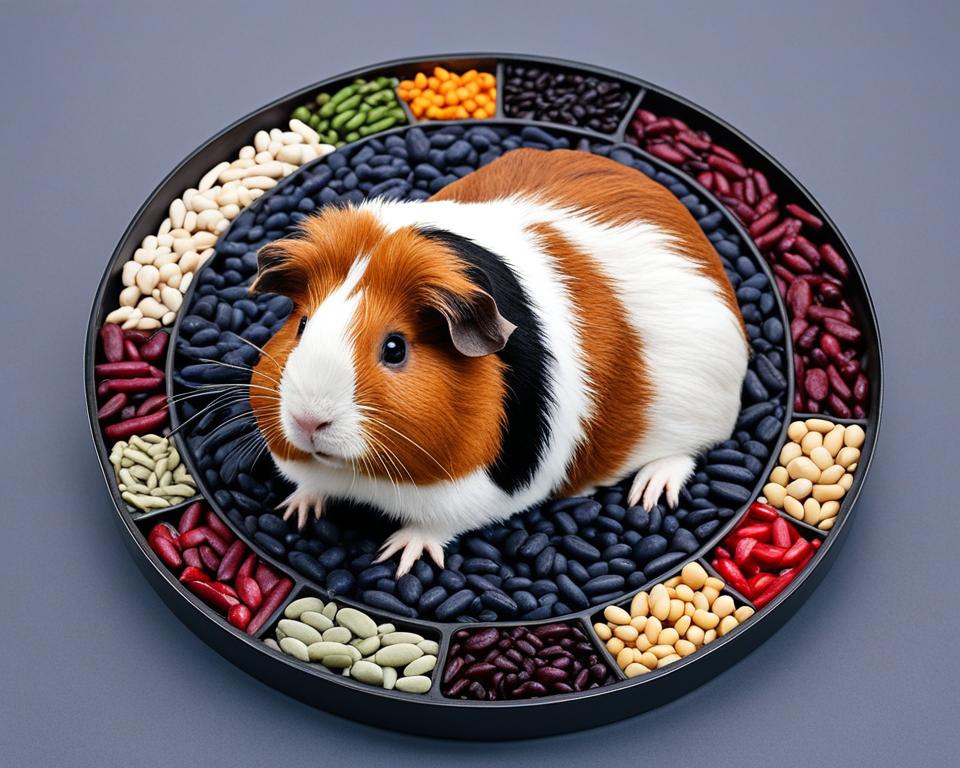
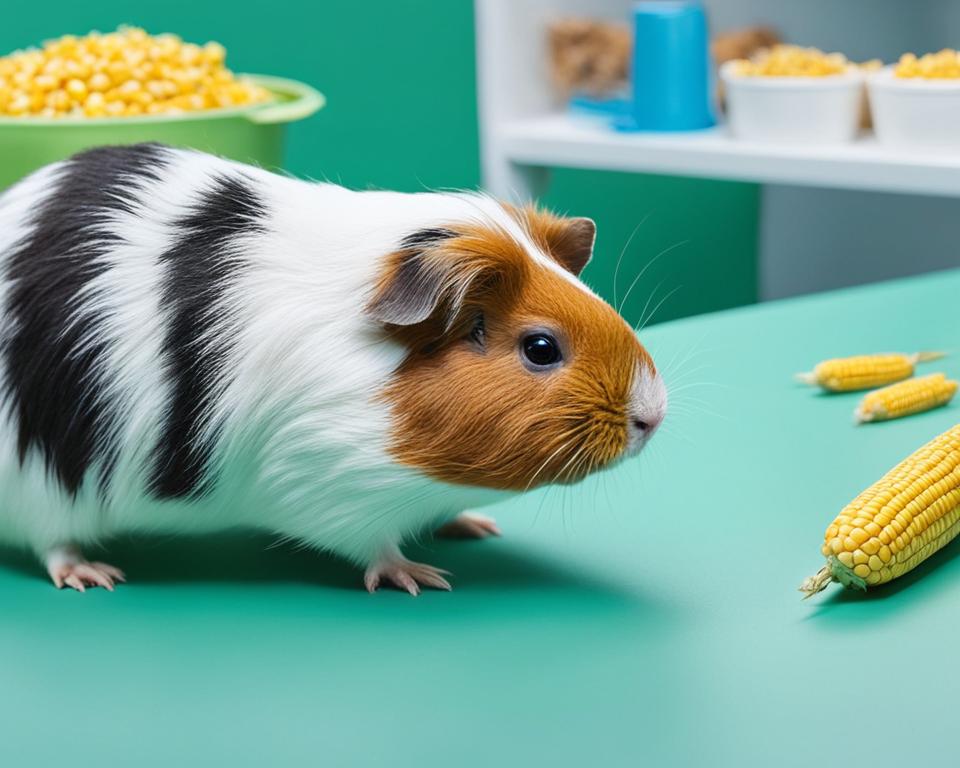
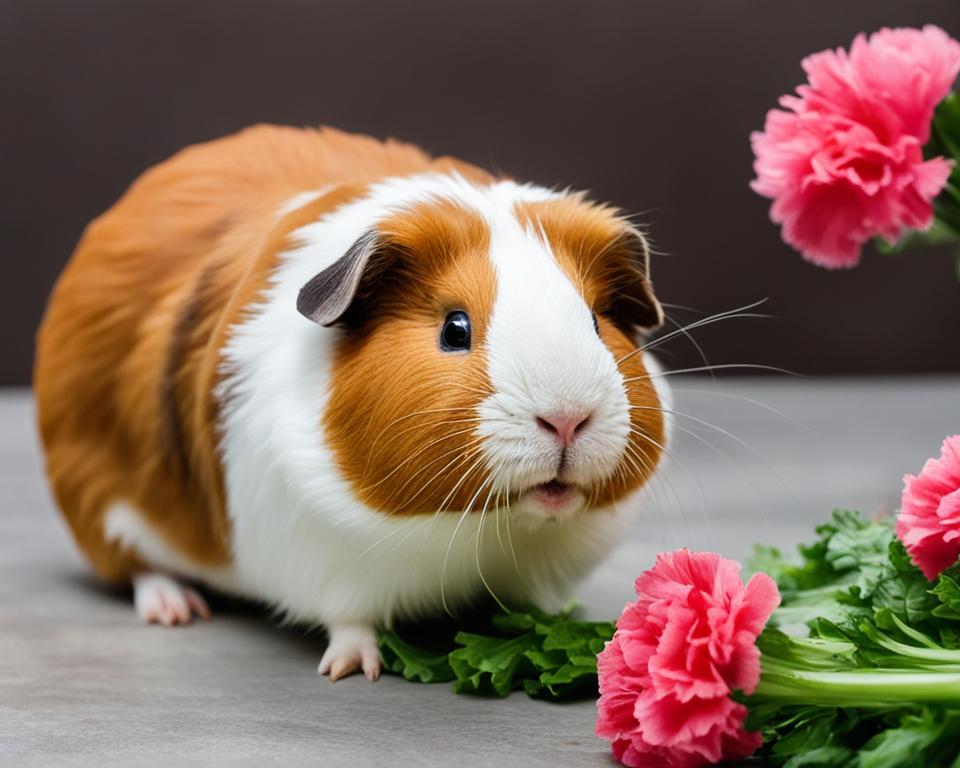
Leave a Reply